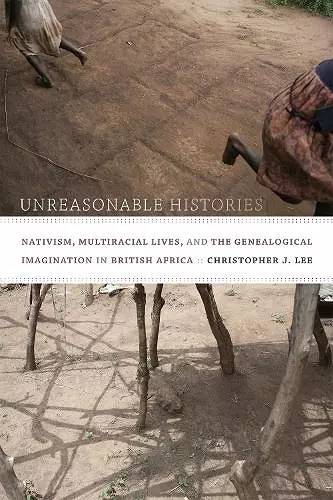Unreasonable Histories
Nativism, Multiracial Lives, and the Genealogical Imagination in British Africa
Format:Paperback
Publisher:Duke University Press
Published:4th Dec '14
Should be back in stock very soon

In Unreasonable Histories, Christopher J. Lee unsettles the parameters and content of African studies as currently understood. At the book's core are the experiences of multiracial Africans in British Central Africa—contemporary Malawi, Zimbabwe, and Zambia—from the 1910s to the 1960s. Drawing on a spectrum of evidence—including organizational documents, court records, personal letters, commission reports, popular periodicals, photographs, and oral testimony—Lee traces the emergence of Anglo-African, Euro-African, and Eurafrican subjectivities which constituted a grassroots Afro-Britishness that defied colonial categories of native and non-native. Discriminated against and often impoverished, these subaltern communities crafted a genealogical imagination that reconfigured kinship and racial descent to make political claims and generate affective meaning. But these critical histories equally confront a postcolonial reason that has occluded these experiences, highlighting uneven imperial legacies that still remain. Based on research in five countries, Unreasonable Histories ultimately revisits foundational questions in the field, to argue for the continent's diverse heritage and to redefine the meanings of being African in the past and present—and for the future.
"[E]rudite and ambitious.... Lee brings to his study a sharp mind, a deep knowledge of recent African historiography and a readiness to develop arguments in a provocative but appealing manner.... [I]t provides the most sophisticated analysis currently available on the emergence and changing shape of these communities in the colonial and postcolonial periods." -- John McCracken * Canadian Journal of African Studies *
"Christopher Lee demonstrates in Unreasonable Histories: Nativism, Multiracial Lives, and the Genealogical Imagination in British Africa that the close analysis of this quintessentially liminal population can illuminate the workings of race as a relational category in British colonial Africa—a category that, Lee argues, has been neglected by historians of mid-twentieth-century Africa in favor of the more compelling one of ethnicity. He uncovers and makes a convincing case for the importance of multiracialism to understanding how racial difference was imagined, constructed, and functioned," -- Miles Larmer * American Historical Review *
"[A] rich and thoughtprovoking study that speaks beyond its immediate subject to raise issues about the boundaries of African studies and the ways in which archives are framed to promote particular epistemologies." -- Elizabeth Elbourne * Journal of Interdisciplinary History *
"This book is a welcome addition to the histories of mixed-descent communities in Britain’s former Central African dependencies.... In this well-organized, carefully researched book, Christopher J. Lee charts the histories of what he describes as ‘multiracial’ Africans from 1910 to the 1960s." -- Juliette B. Milner-Thornton * Journal of African History *
"Unreasonable Histories is elegant and creative, well researched and very interesting....The materials are rich, and the stories he tells of the lives of multiracial Africans are moving. It is in his recovery and retelling of these personal accounts that the book comes alive, taking on a vibrancy that leaves no doubt to its relevance to African Studies and African history today." -- Melissa Graboyes * Canadian Journal of History *
"Lee’s important book on multiracial people in British Central Africa has insights that will be appreciated by scholars of historiography, method, colonialism, postcolonialism, racial thinking, and nativism. . . . Fresh and insightful. . . . Lee’s imaginative approach recreates a multiracial history grounded in genealogical connections and the opportunities such ties brought." -- Allison K. Shutt * African Studies Review *
ISBN: 9780822357254
Dimensions: unknown
Weight: 494g
368 pages